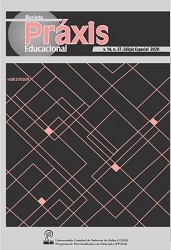EDUCATION AND UPBRINGING THROUGH SOCIALIZATION OF EVERY CHILD OF THE ARCTIC INDIGENOUS PEOPLES IN THE GLOBAL MODERN SOCIETY
DOI:
https://doi.org/10.22481/praxisedu.v16i37.6174Keywords:
Upbringing, Education, Civilization, SocializationAbstract
At present, Russia is experiencing a revival of national cultures, traditions, and spiritual foundations of its peoples. This determines a growing interest in the issues of education, upbringing and development of a person who is aware of the main norms and values of their people, society and country, has a rich ethnocultural background, a developed identity in the multicultural environment, and a respectful attitude to different cultural values of other peoples that are unique and original. These problems can be solved by means of education. The research goal of this study was to propose and justify the theoretical and methodological foundations for the development of a regional educational space using the pedagogical potential of ethnocultural traditions in the system of education and upbringing through the socialization of every child of the Arctic indigenous peoples. The research objectives are: to solve the problem of upbringing and education through ethnocultural traditions, and to identify ways and forms of their implementation through the socialization of the indigenous peoples of the Arctic. The problems of the formation of the Arctic indigenous peoples were studied with cultural, civilizational, synergetic, and interdisciplinary methodological approaches, which enabled the authors to comprehensively explore the phenomenon of the circumpolar (Arctic) civilization, to substantiate the need to increase the role of the ethnocultural component in the socialization, education and upbringing of the youth of the indigenous (nomadic) peoples of the North in modern conditions of globalization, and to highlight its pedagogical potential. The following methods were used: field research, interviews, observations, and testing. The study involved 305 third and fourth graders in rural educational institutions; 76 of them studied in nomadic schools. The results of the study demonstrated positive dynamics. Qualitative data obtained during the interviews or observation can be used as the basis for selecting units or indicators when creating other research tools aimed at obtaining quantitative data. The theoretical and practical significance of the study is determined by the fact that its conclusions and provisions can be used for practical realization of the potential of the ethnocultural traditions of the Arctic indigenous peoples.
Downloads
References
Cars, M., & West, E.E. (2015). Education for Sustainable Society: Attainments and Good Practices in Sweden during the United Nations Decade for Education for Sustainable Development (UNDESD). Environment, Development and Sustainability, 17(1), 1–21.
Costello, B., Wachtel, J., & Wachtel, T. (2009). The Restorative Practices Handbook for Teachers, Disciplinarians and Administrators (Building a Culture of Community in Schools). Bethlehem, Pennsylvania: International Institute for Restorative Practices.
Danilov, D.A. (2016). Updating Education in the Context of Global Transformations. Cheboksary: Center for Scientific Cooperation “Interactive Plus”.
Dannemark, N. (2015). Språk I Guovdageaidnu. The Arctic 21st Century. Humanitarian Sciences, 3(6), 60-76.
Dannemark, N., Logje, M.R., Siri, K.M., Syrovatskaya, A., & Todal, J.J. (2015). Undervisninga i samisk som førstespråk i noreg eit historisk tilbakeblikk. The Arctic 21st Century. Humanitarian Sciences, 3(6), 52-60.
Dannemark, N., Logje, M.R., Siri, K.M., Syrovatskaya, A., Todal, J.J., & Vinokurova, A. (2017). Indigenous Languages of the North: A Comparative Analysis of the Language Situations in Topolinoe in Sakha and Guovdgeaidnu in Sápmi. WINHEC: International Journal of Indigenous Education Scholarship, 1, 57-81.
Fondahl, G., Filippova, V., & Mack, L. (2015). Indigenous Peoples in the New Arctic. B. Evengård, L.J. Nymand, & Ø. Paasche (Eds.), The New Arctic (pp. 7-22). Cham: Springer.
Gorchinskaya, A.A. (2015). Cognitive activity of a primary school student. https://infourok.ru/programmi-nablyudeniya-viyavleniya-interesov-shkolnikov-k-nauchnopoznavatelnoy-deyatelnosti-3222495.html
Gumilev, L.N. (1988). Ethnic Groups in Landscapes. Man and Nature, 10, 78-89.
Heininen, L. (2015). The Arctic Region as a Space for Trans-disciplinary, Resilience and Peace. Arctic and North, 4(21), 26-33.
Ismail, R., Gopalasamy, R.C., Saputra, J., & Puteh, N. (2019). Impacts of a Colonial Policy Legacy on Indigenous Livelihoods in Peninsular Malaysia. Journal of Southwest Jiaotong University, 54(5). http://jsju.org/index.php/journal/article/view/368
Ivars, P., Fernandez-Verdu, C., Llinares, S., & Choy, B.H. (2018). Enhancing Noticing: Using A Hypothetical Learning Trajectory to Improve Pre-Service Primary Teachers’ Professional Discourse. EURASIA Journal of Mathematics, Science and Technology Education, 14(11), 1–16.
Kefeli, I.F. (2013). Circumpolar Civilization in the Geo-Civilization Structure of the Global World. Partnership of Civilizations, 4, 354-365.
Khakimov, E.R. (2003). Ethno-Psychology and Ethnopedagogy in the Pedagogical Process Design. Izhevsk.
Kopnina, H. (2013). An Exploratory Case Study of Dutch Children’s Attitudes towards Consumption: Implications for Environmental Education. The Journal of Environmental Education, 44, 128-144.
Koptseva, N.P., & Kirko, V.I. (2015). The Impact of Global Transformations on the Processes of Regional and Ethnic Identity of Indigenous Peoples Siberian Arctic. Mediterranean Journal of Social Sciences, 6(3), 217-224.
Krupnov, Yu.V. (2003). Northern Civilization. Academy of Trinitarianism. http://www.trinitas.ru/rus/doc/0012/001a/00120086.htm
Lukin, Yu.F. (2012). Arctic and Social Fears. Arctic and North, 5. http://www.arcticandnorth.ru/upload/iblock/c45/03.pdf
Malakhova, E.V., Kirko, V.I., and Yanova, M.G. (2018). Economic Socialization of Senior Schoolchildren in the Conditions of the Extreme North. Journal of Siberian Federal University. Humanities & Social Sciences, 11, 1301-1314.
Meili, R. (1972). Basics of Personality Traits. Bern: Huber.
Nezdemkovskaya, G.V. (2009). Formation of Ethnopedagogics in Russia. Tomsk State University Journal, 326, 186-193.
Öhman, J. (2006). Pluralism and Criticism in Environmental Education and Education for Sustainable Development: A Practical Understanding. Environmental Education Research, 12, 149-163.
Penttila, R.E.J. (2015). Student and Researcher Mobility in the European Arctic: Towards Growth in the North. https://www.uarctic.org/news/2015/6/student-and-researcher-mobility-in-the-european-arctic/
Piven, G., & Pak, I.U. (2006). Higher Education in Kazakhstan and the Bologna Process. Russian Education & Society, 48(10), 82-91.
Ribot, T. (1906). Essay on the Creative Imagination. Chicago, Illinois: Open Court Publishing Company.
Robbek, V.A. (2007). Scientific Bases of Education System Formation of Nomadic Peoples of the North. Novosibirsk: Nauka.
Rodari, G. (2011). Fantasy Grammar. Moscow: Samokat.
Seroshevsky, V.L. (1993). Yakuts: Experience in Ethnographic Research. Moscow.
Sevruk, A.I., & Yunina, E.A. (2003). Monitoring the Quality of Teaching at School: A Guide for Teachers and Directors of Educational Institutions. Moscow: Pedagogical Community of the Russian Federation.
Tevlina, V.V., & Soleim, M.N. (2019). A Large-Scale Meeting of Nordic and Russian Historians, Philologists and Archaeologists in the Arctic Norway. Arctic and North, 36, 143-150.
Vinokurova, A.A., Dannemark, N., & Todal, J. (2016). Indigenous Languages of the North – A Comparison of the Situation in Topolin in the Republic of Sakha (Yakutia) and Guovdageainu in Sapmi. Meridian, 3(3). http://meridian-journal.ru/site/article?id=250
Volchik, V., & Maslyukova, E. (2019). Trust and Development of Education and Science. Entrepreneurship and Sustainability Issues, 6(3), 1244-1255.
Volkov, G.N. (2011). Pedagogy of Life. Cheboksary: Chuvash Publishing House.
Yakovets, Yu.V., & Rastvortsev, E.E. (2017). The System of Long-Term Goals of Sustainable Development of Civilizations. Moscow: Institute of Economic Strategies.
Zeibote, Z., Volkova, T., & Todorov, K. (2019). The Impact of Globalization on Regional Development and Competitiveness: Cases of Selected Regions. Insights into Regional Development, 1(1), 33-47.
Zhirkova, Z.S. (2017). Circumpolar Educational Space of the Region. St. Petersburg: Renome.
Downloads
Published
How to Cite
Issue
Section
License
Você é livre para:
Compartilhar - copia e redistribui o material em qualquer meio ou formato; Adapte - remixe, transforme e construa a partir do material para qualquer propósito, mesmo comercialmente. Esta licença é aceitável para Obras Culturais Livres. O licenciante não pode revogar essas liberdades, desde que você siga os termos da licença.
Sob os seguintes termos:
Atribuição - você deve dar o crédito apropriado, fornecer um link para a licença e indicar se alguma alteração foi feita. Você pode fazer isso de qualquer maneira razoável, mas não de uma forma que sugira que você ou seu uso seja aprovado pelo licenciante.
Não há restrições adicionais - Você não pode aplicar termos legais ou medidas tecnológicas que restrinjam legalmente outros para fazer qualquer uso permitido pela licença.












